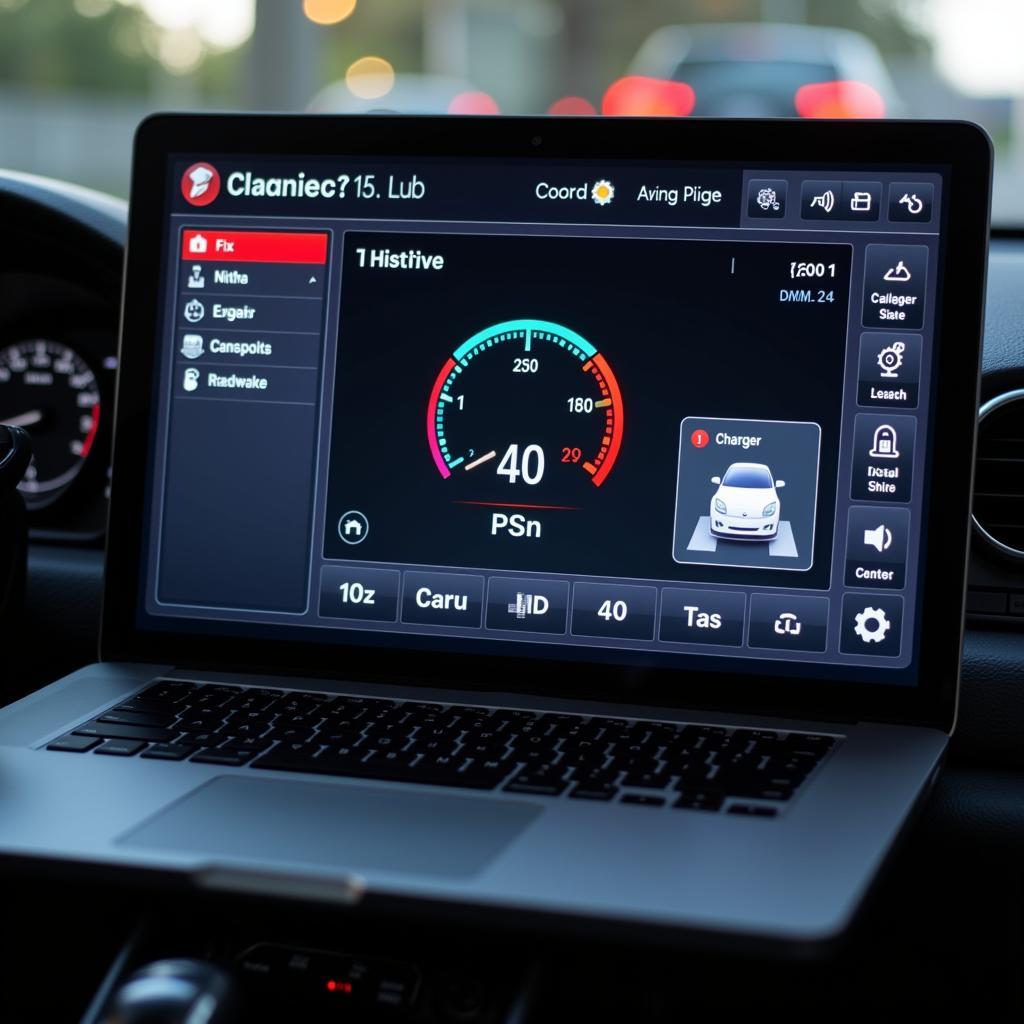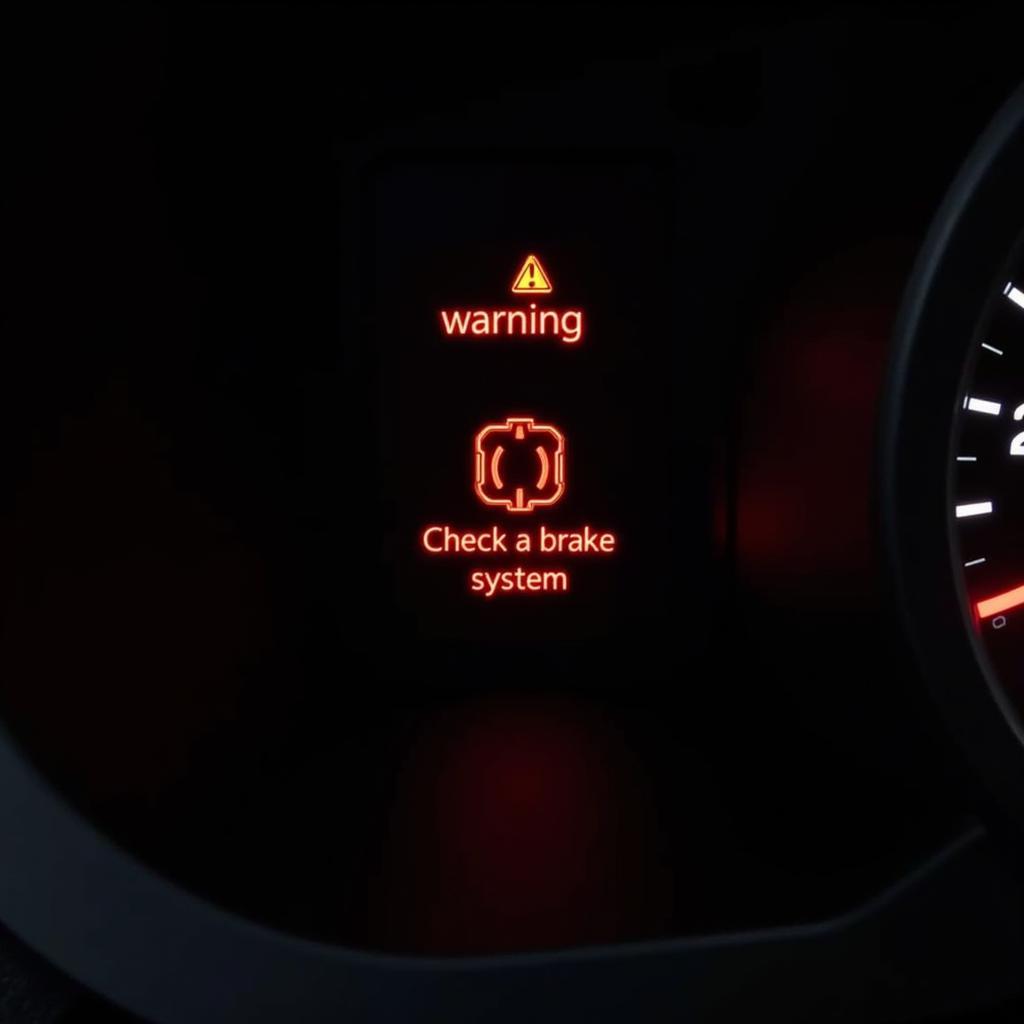The dreaded “charger brake” warning light flashing intermittently on your dashboard can be a confusing and frustrating experience. This warning light typically illuminates when there’s an issue with your car’s regenerative braking system, a key component in hybrid and electric vehicles. But what does it mean when the light flickers on and off?
This comprehensive guide delves into the potential causes of an intermittent charger brake warning light, guides you through some troubleshooting steps, and advises you on the best course of action.
Understanding the Charger Brake System
Before we dive into the causes of an intermittent warning light, it’s important to understand how the charger brake system works. In hybrid and electric vehicles, the system captures energy typically lost during braking and uses it to recharge the high-voltage battery. When you apply the brakes, the electric motor essentially reverses, becoming a generator that slows the car and simultaneously generates electricity.
Common Causes of an Intermittent Charger Brake Warning Light
While a mechanic with specialized diagnostic tools can pinpoint the exact issue, several common culprits often lead to an intermittent charger brake warning light:
- Faulty Brake Pedal Position Sensor: This sensor relays information about the position of the brake pedal to the car’s computer. A malfunctioning sensor can send incorrect signals, intermittently triggering the warning light.
- Loose Connections: Over time, vibrations and temperature changes can cause connections within the regenerative braking system to loosen. This can result in inconsistent communication and trigger intermittent warning lights.
- Software Glitches: Like any computer system, your car’s software can experience glitches. These temporary malfunctions can impact the charger brake system and cause the warning light to flicker.
- Low Battery Charge: In some cases, a low high-voltage battery charge can trigger the charger brake warning light. This is because the regenerative braking system may not function optimally when the battery is depleted.
- Problem with the DC-to-DC Converter: The DC-to-DC converter plays a vital role in regulating the voltage between the high-voltage battery and the 12-volt system. A malfunctioning converter can disrupt the regenerative braking system and trigger the warning light.
Troubleshooting an Intermittent Charger Brake Warning Light
If your charger brake warning light is intermittent, here are a few troubleshooting steps you can try:
- Check your 12-volt battery: A weak or failing 12-volt battery can cause unexpected issues, including false warning lights. Consider having your battery tested and replaced if necessary.
- Inspect the brake fluid level: Low brake fluid can interfere with the hydraulic braking system, potentially impacting the regenerative system. Check your brake fluid level and top it off if needed. Refer to your owner’s manual for the correct type of brake fluid.
- Check for Diagnostic Trouble Codes (DTCs): If you have access to an OBD-II scanner, you can check for DTCs stored in your car’s computer. These codes can provide valuable clues about the underlying issue.
When to Seek Professional Help
While troubleshooting can help identify minor issues, it’s crucial to consult with a qualified mechanic specializing in hybrid or electric vehicles if:
- The warning light remains on constantly: This often indicates a more serious problem requiring immediate attention.
- The warning light is accompanied by other symptoms: This could include reduced braking performance, unusual noises during braking, or a burning smell.
- You’re uncomfortable performing DIY troubleshooting: Improperly handling high-voltage systems can be dangerous.
Remote Diagnostics and Software Solutions
The future of automotive repair is here with remote diagnostics and software solutions. Instead of multiple trips to the mechanic, you can now have your car diagnosed and even repaired remotely.
Here’s how it works:
- A trained technician remotely accesses your car’s computer system using specialized software.
- The technician runs diagnostics, identifies the root cause of the problem, and often provides software updates or recalibrations to fix the issue.
- This can often resolve issues like software glitches, sensor calibration errors, and even some problems with the DC-to-DC converter.
 Remote Diagnostics Software
Remote Diagnostics Software
Preventing Future Issues
While not all problems are preventable, proactive maintenance can go a long way in keeping your car’s braking system in top shape:
- Regularly scheduled maintenance: Follow your manufacturer’s recommended maintenance schedule for brake inspections, fluid flushes, and software updates.
- Drive gently: Avoid harsh braking whenever possible. This reduces stress on the regenerative braking system and extends its lifespan.
- Pay attention to warning signs: Address any warning lights or unusual symptoms promptly to prevent minor issues from escalating.
Conclusion
An intermittent charger brake warning light can be a cause for concern, but it doesn’t always signify a major problem. By understanding the potential causes and utilizing available resources like remote diagnostics and software solutions, you can confidently address this issue and keep your hybrid or electric vehicle running smoothly.
Remember, while DIY troubleshooting can be helpful, it’s always best to consult with a qualified mechanic specializing in car battery parasitic draw test for a thorough diagnosis and repair.

